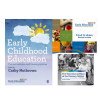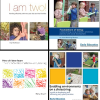Letter to the next Prime Minister
The letter below sets out our key asks for the next government.
Ofsted’s latest annual review highlights the impact of recruitment and retention challenges and finds a link between inspection outcomes and the proportion of graduates in a setting. It recognises the work which settings are doing to address the impact of the pandemic on young children.
It found that 96% of providers on the early years register were graded good or outstanding at their latest inspection, compared to 97% at the same time last year. Perhaps as a consequence of prioritising new providers, those which had not been recently inspected and those with a rating of less than good, fewer providers were judged good or outstanding in 2021/22 than in 2019/20. The report also notes that the gap in the quality of education widened between outstanding and weaker providers.
It comments that although the proportion of disadvantaged 2-year-olds taking up their free entitlement has returned to pre-pandemic levels, many children are still missing out on their entitlements.
The report devotes considerable attention to current recruitment and retention challenges in the early years (and elsewhere in the education sector). It finds that providers with multiple settings appear to do better at recruiting, retaining and developing their staff. It notes the potential impact of staff qualifications and experience on quality and consistency of care, and emphasises that experienced staff need to be working with all ages of children, not just the oldest in the cohort. It flags that the number of apprentices at levels 2 and 3 has fallen from 27,200 in 2016/17 to 16,200 in 2021/22, raising concerns about the effectiveness of this route to address workforce shortages.
On the level of qualifications, it notes that:
“Outstanding providers have, on average, nearly twice as many staff with a degree-level qualification as those receiving other inspection outcomes.”
Finally, it addresses the fall in the number of providers – mainly a continuing steep decline in the number of childminders – and places, while speculating that this may be linked to the decline in the size of the current cohort and moves towards more home working by parents also reducing demand.
Early Education’s Chief Executive, Beatrice Merrick commented:
This report rightly recognises the vital role of the early years workforce in delivering the quality of early education that young children need, especially in the aftermath of the pandemic. We cannot afford to lose experienced and well-qualified staff due to the poor pay and conditions in the sector caused by persistent underfunding by government. There is important evidence in the report about the link between the proportion of graduate staff and a setting being rated outstanding, that reinforces the argument for increasing the number of graduates in the workforce.
The letter below sets out our key asks for the next government.
On 10 June, Labour announced their plans for “over three thousand new nursery classes across England to open up access to childcare hours for families”,
The Conservative Manifesto has promised to extend Family Hubs to all local authorities. This would both extend funding for the 75 local authorities where they
The Lib Dems have published their manifesto, including commitments to incorporate the UN Convention on the Rights of the Child into UK law and to
Today, Friday 17 May, the Early Education and Childcare Coalition (EECC) has launched its new manifesto, with proposals to rescue and reform England’s early education
A report published by the National Audit Office (NAO) today finds that the timetable for the roll-out of the new funded early education and childcare
A new campaign to boost recruitment to the early years sector in England is being launched today by the government. The government press release says:
The Department for Education has today published its response to the EYFS consultation conducted in the summer. The changes will be implemented from January 2024
For many of us, the path we’ve taken in our careers can often be traced back to the passions and talents of our childhood and
DfE has today launched a consultation on the new funding rates which will apply for 2-year-olds and under 2s when the new entitlements are introduced
The Department for Education has today announced that the extra £204m for early years announced in the budget will be allocated to local authorities as
In a speech today, Kier Starmer will set out Labour’s plans to expand opportunity via five “missions” including “Early years reform – to boost child development with an
The Department for Education (DfE) is currently consulting on proposals to amend the Early Years Foundation Stage. They propose relaxing the requirements around the minimum
by Dr Jo Albin-Clark, Edge Hill University and Dr Nathan Archer, Leeds Beckett University Inspection in the news Being involved in education in England involves
DfE has issued slightly more detail about the planned uplift in the hourly rates for the current and new entitlements, following the announcements in the
The Department for Education (DfE) have published their response to the consultation on potential changes to staff:child ratios. The consultation received responses from nearly 10,000
by Kayla Halls, Early Years Research Fellow at Middlesex University & Mona Sakr, Senior Lecturer in Early Childhood at Middlesex University’ Leaders in the early
Today, teachers from the National Education Union are striking, including many working in nursery and reception classes. In the last week, the Department for Education
by Amanda Ince and Liz Bullough, UCL Institute of Education “I want to be an inspiring leader who can inspire my colleagues in my setting
We welcome the news that our President, Professor Cathy Nutbrown, has been made a Dame in the year’s New Years Honours list. This is much
The government’s latest changes to the early years funding formulae bring two key changes which we pointed out in our response to the consultation would
DfE have today announced the early years funding settlement for 2023-24, which leaves the early years sector struggling on below inflationary increases. While an additional
The open letter below was sent to Ofsted in November 2023. Download Ofsted’s response We the undersigned are writing to you about the recently published
The Ofsted early years curriculum review Best start in life part 1: setting the scene, has just been published, which they describe as being part of
by Clarissa Frigerio Why are there so few men teaching in the early years? I have worked in the profession for almost 9 years, and
It could be argued that teachers who move into teaching reception for the first time, face the same challenges as the children themselves as they start in reception.
The tenth early years minister in ten years, Kelly Tolhurst, is now in post. It’s good news that early years is part of a Minister
Comparing figures from January 2022 and January 2020, progress is being made towards previous levels of take up of funded early education. Latest figures from
Early Education welcomes the news that the new National Plan for Music Education has been extended to cover the early years. We are glad to
The Times Education Commission has today published a report which calls for “A significant boost to early years funding targeted at the most vulnerable and
Cathy Nutbrown, President of Early Education The twelve sessions of the May Annual National Conference 2022 left me reflecting on a strong thread which I
Ofsted has today launched a new five-year strategy. Elements of this which affect the early years include commitments to “simplify the regulatory regime for childminders”
We welcome the government’s new Sustainability and climate change strategy for education and children’s services, and that early years is reflected through a range of
External Vacancies Internal Vacancies To advertise here, contact office@early-education.org.uk Organisation and multisite members may advertise vacancies for free as part of the membership package. Download Job advertisement
A survey of maintained nursery schools carried out by Early Education in June 2021 has found increasing demand from children with SEND in the current
The DfE have issued documents to support schools and settings to understand how to report to the Early Years Census in the context of the
Raymond Williams maintained, after years of examining constructs of culture and society that “Culture is one of the two or three most complicated words in






Early Education
2 Victoria Square
St Albans
AL1 3TF
T: 01727 884925
E: office@early-education.org.uk